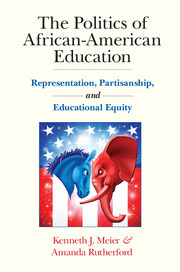Book contents
- Frontmatter
- Dedication
- Contents
- List of Figures
- List of Tables
- Preface
- 1 Representation, Partisanship, and Equality in Education
- 2 Two Myths: Separate but Equal and Nonpartisan Education
- 3 The Politics of African- American School Board Representation: Partisanship, Structure, and Resources
- 4 Race and Street- Level Bureaucrats: With a Little Help from My Friends
- 5 Partisanship, Teacher Representation, and Access to Education Opportunities
- 6 Race, Politics, and Student Learning
- 7 Can You Beat the Ovarian Lottery?
- References
- Index
3 - The Politics of African- American School Board Representation: Partisanship, Structure, and Resources
Published online by Cambridge University Press: 05 August 2016
- Frontmatter
- Dedication
- Contents
- List of Figures
- List of Tables
- Preface
- 1 Representation, Partisanship, and Equality in Education
- 2 Two Myths: Separate but Equal and Nonpartisan Education
- 3 The Politics of African- American School Board Representation: Partisanship, Structure, and Resources
- 4 Race and Street- Level Bureaucrats: With a Little Help from My Friends
- 5 Partisanship, Teacher Representation, and Access to Education Opportunities
- 6 Race, Politics, and Student Learning
- 7 Can You Beat the Ovarian Lottery?
- References
- Index
Summary
Representation is a central concept in the study of politics (Eulau and Karps 1977; Mansbridge 1999; Pitkin 1967). With the increase in descriptive representation of women and racial minorities in legislative bodies worldwide, scholarly effort has focused on how electoral structures affect this descriptive representation (Baldez 2006; Canon 1999; Cox 1997; Epstein and O'Halloran 1999; Krook 2006; Lublin and Voss 2000; Norris 2004; Schwindt-Bayer and Mishler 2005; Shotts 2003a, 2003b). Similar to the comparative literature, US scholarship concludes that the electoral success of minorities can be linked to electoral structures (Behr 2004; Canon 1999; Engstrom and McDonald 1982, 1986, 1997; Lublin 1997; Sass and Mehay 2003; Shah, Marschall, and Ruhil 2013, among others). One issue involving the relationship between electoral systems and African-American representation in the United States remains in doubt. At-large elections, long thought to limit the election of minorities to office, may have declined in influence, but the issue remains contested (see Leal, Martinez-Ebers, and Meier 2004; Trounstine and Valdini 2008; Welch 1990).
This chapter investigates how electoral structure influences African-American representation with study of the 1,800 largest school districts in the United States for the years 2001, 2004, and 2008. The logic of median voter models as applied to minority politics requires that the racial minority in question also be a numerical minority. If African Americans are a voting majority in a school district, then they should attain a majority of the seats on the board regardless of whether the system uses at-large elections or single-member districts (SMDs). As a result, the initial analysis in this chapter will focus on only those school districts where African Americans are less than 50 percent of the total population. In these cases, our findings linking electoral systems to descriptive representation show that African Americans actually do better in at-large systems. While this minority group may have been disadvantaged by at-large districts thirty years ago, they have overcome these hurdles and now appear to be better off under this type of electoral structure in the case of school board elections. Because this finding is neither predicted by theory nor precedented in the empirical literature, we consider several possible explanations and find that how electoral structures influence partisan incentives explains the apparent advantage of at-large elections for African Americans.
- Type
- Chapter
- Information
- The Politics of African-American EducationRepresentation, Partisanship, and Educational Equity, pp. 38 - 73Publisher: Cambridge University PressPrint publication year: 2016



